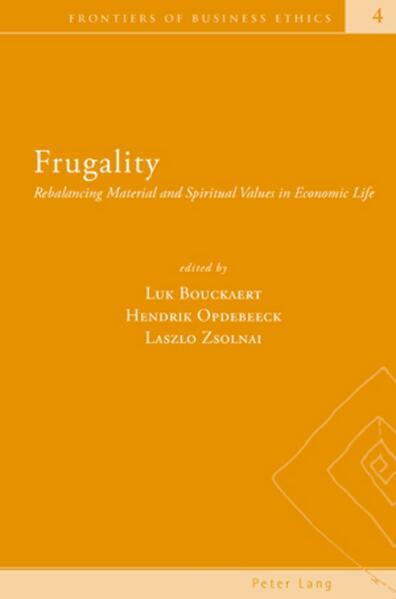
Zustellung: Mo, 05.05. - Do, 08.05.
Versand in 6 Tagen
VersandkostenfreiBestellen & in Filiale abholen:
This book examines frugality as an ideal and an 'art de vivre' which implies a low level of material consumption and a simple lifestyle, to open the mind for spiritual goods as inner freedom, social peace and justice or the quest for God or 'ultimate reality'. By rational choice we can develop a more frugal and sufficient way of life, but material temptations can always overwrite our ecological, social and ethical considerations. But the spiritual case for frugality is strong enough. Spiritually based frugal practices may lead to rational outcomes such as reducing ecological destruction, social disintegration and the exploitation of future generations.
Inhaltsverzeichnis
Contents: Luk Bouckaert/Hendrik Opdebeeck/Laszlo Zsolnai: Why Frugality Luk Bouckaert: Rational versus Spiritual Concepts of Frugality Rafael Esteban: Frugality and the Body Francis Kadaplackal: How the Idea `Created Co-Creator Can Contribute to the Nurturing of Frugality in Economic Life Laurie Michaelis: Quaker Simplicity Dirk Geldof: Overconsumption Ronald Commers/Wim Vandekerckhove: Frugality and the Moral Economy of Late Capitalism Knut Ims/Ove Jacobsen: Consumerism and Frugality: Contradictory Principles in Economics? Hendrik Opdebeeck: The Urgency of a Frugality-based Economics Herman E. Daly: Frugality First Ronald Jeurissen/Bert van de Ven: Frugal Marketing: Can Selling Less Make Business Sense? Robert H. Frank: The Progressive Consumption Tax Laszlo Zsolnai: Buddhist Economic Strategy.
Jetzt reinlesen: Inhaltsverzeichnis(pdf)Produktdetails
Erscheinungsdatum
27. Februar 2008
Sprache
englisch
Seitenanzahl
338
Reihe
Frontiers of Business Ethics
Herausgegeben von
Luk Bouckaert, Hendrik Opdebeeck, Laszlo Zsolnai
Weitere Beteiligte
Luk Bouckaert, Hendrik Opdebeeck, Laszlo Zsolnai
Verlag/Hersteller
Produktart
kartoniert
Gewicht
465 g
Größe (L/B/H)
220/150/19 mm
Sonstiges
Paperback
ISBN
9783039111312
Entdecken Sie mehr
Bewertungen
0 Bewertungen
Es wurden noch keine Bewertungen abgegeben. Schreiben Sie die erste Bewertung zu "Frugality" und helfen Sie damit anderen bei der Kaufentscheidung.









